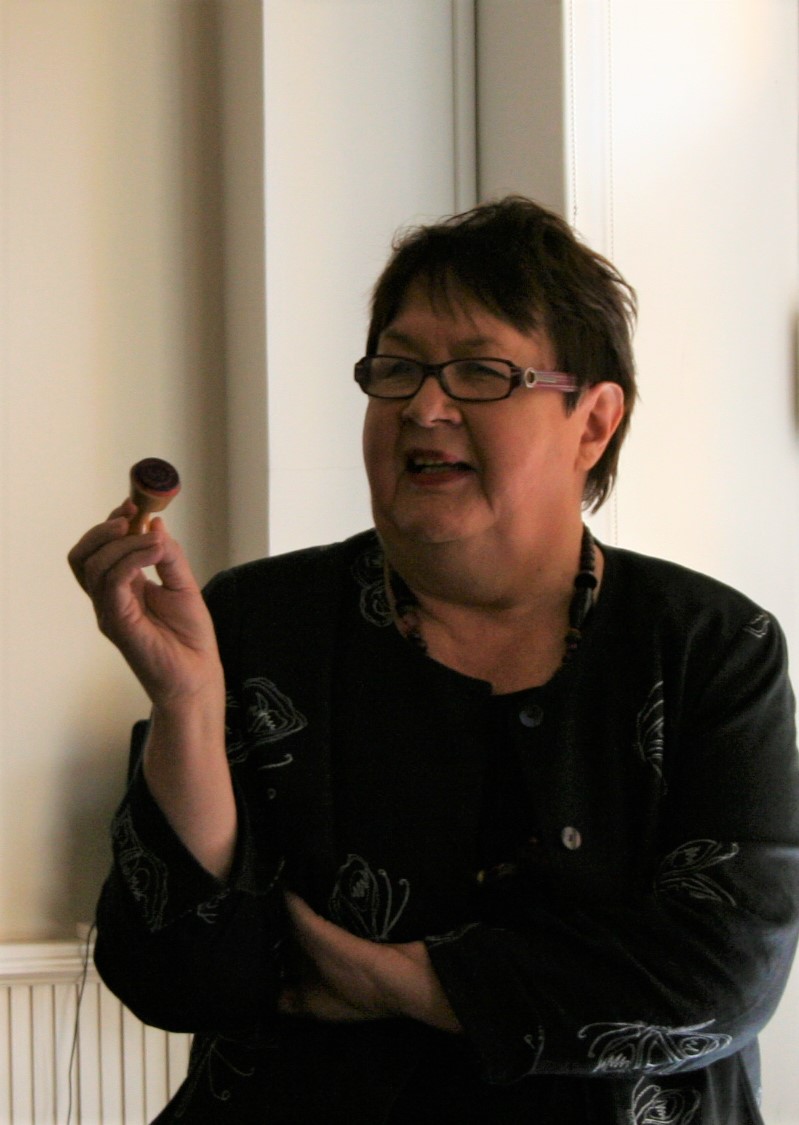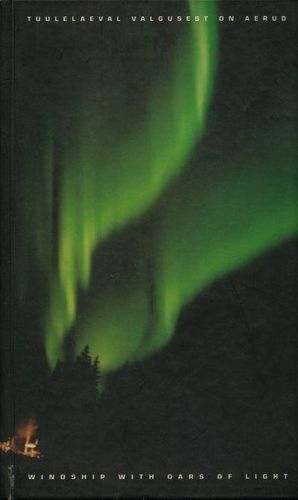Anja Esteri Salokannel (b. 1947) is a celebrated Finnish publisher, author, and translator who has received the Order of the White Rose of Finland (gold cross with medal) and Estonia’s Order of the Cross of Terra Mariana (fourth class). She has translated most of Jaan Kaplinski’s works, as well as books by Ülo Tuulik, Viivi Luik, A. H. Tammsaare, Leelo Tungal, and many others, into Finnish.
On October 29th, 2021, the release of a nearly 600-page collection of Jaan Kaplinski’s writing was celebrated at the Estonian Embassy in Helsinki, entitled: Ilta tuo takaisin kaiken. Runoja kuudelta vuosikymmeneltä. Salokannel is responsible for most of the book’s translations from Estonian; Pauli Tapio worked on several of the Russian-language texts. Unfortunately, Kaplinski himself did not live to see the monumental book’s release.
Publishing a lifetime achievement is more than enough reason for an interview, so I meet Anja at the home she has shared for over forty years with fellow translator and Estophile Juhani Salokannel on Kulosaari Island in Helsinki, not long after Finnish Independence Day. Our conversation was in Finnish.
Their living room window looks out over the frozen bay, where skiers occasionally glide past; the coffee table is set with Christmas sweets made by the couple’s children and grandchildren. Next to the plates is the hefty Kaplinski collection and a book of Paavo Haavikko’s poems published in an Estonian translation at about the same time – both in stylish, greenish covers.
How did you first find your way to literature?
I was born in Kangasniemi Parish, South Savo, Finland. My interest in language and literature developed in school. This was greatly thanks to our grammar teacher, who was able to truly inspire and foster a love for the subject. I read a lot, my particular favorites being works by Helvi Juvonen, Eino Leino, and Aaro Hellaakoski.
I gradually started writing, too. When I submitted a story to a youth writing contest and won, the prize was a toy telescope that showed images from incredible places around the world, such as Niagara Falls. Back then, it was like a magical object. It’s strange to think of now. I suppose such a toy would mean nothing to a child of today’s “glowing rectangle” generation.
So, was enrolling in the Finnish language and literature program at the University of Helsinki a logical next step?
I suppose it was. I met Juhani at university and we became companions in both life and work. Estonian entered my life at that time as well. I was inspired by the legendary Eeva Niinivaara (1900–2000), who worked as a tireless bridge between the Estonian and Finnish languages and was certainly one of the most colorful and influential people I’ve ever known. Certainly, none of Eeva’s former students will ever forget her presence, and I’m glad to have been able to interview her in around 1983/1984: the recording is preserved in the Finnish Literary Society’s archives, and it even resulted in a work titled Yhä paistaa sama aurinko. She and I became close friends when she was a pensioner and I had just finished my studies at university. Eeva was a rare specimen: a charismatic instructor; a greatly talented actress and musician; and so, so vibrant.
Eeva was your original connection to Estonia. And from there?
My very first visit was in 1970. A whole group of us went over on the Vanemuine ferry (a whole four hours at sea!) for a conference on Finno-Ugric nations. I remember staying at the Kungla Hotel on Kreutzwaldi Street, which had just been built the year before and has since been demolished. I quickly met many people in the Estonian cultural sphere at the time: Viivi Luik, Jaak Jõerüüt, Lennart Meri, Paul-Eerik Rummo, Piret Saluri, Sirje and Rein Ruutsoo, Kalle Kurg the Kross family, the Vetemaas, and others. It wasn’t long before I was translating Estonian literature into Finnish: mainly short stories and radio dramas at first, such as those by Ülo Tuulik and Teet Kallas, but also plays like A. H. Tammsaare’s The King is Cold and a dramatization of his novel The New Devil of Hellsbottom.
Although you graduated from the University of Helsinki with a master’s in philosophy and were certified as a Finnish language teacher, your path led to the theater – is that correct?
Yes, it is. We were living in Jyväskylä, where I worked as the secretary of public relations at the Jyväskylä City Theater from 1973–1979. My job was primarily to draft playbills and see that the plays made it into smaller rural communities as well.
Translating was still just a hobby at the time. Juhani and I worked together on Ülo Tuulik’s novel Trampled By War, which was published by Gummerus in 1976. The Tuulik family visited us in Jyväskylä on a very cold winter’s day, Lennart Meri once drove up to the house in his red car, and many other Estonian writers stopped by at one point or another. Juhani and I attended several plays in Estonia during that decade as well, leaving me with unforgettable memories of Juhan Viiding and Mati Unt.
We can’t overlook your own writing in addition to all your editing and translating.
Anja smiles and fetches her poetry collection Metsän jälki.
My poetry debut was published by Otava in 1982 and received the L. Onervo Award. Even though people constantly asked when I’d publish another, that first collection remained my last. I no longer felt like publishing my original poetry, so I stuck to translating while also editing and compiling books.
I worked for a short period as the Acting Director of the Finnish Literature Information Center and was hired by Otava in 1984. There, I started out as an editor in the literature department, later became a senior editor, and remained there until 2010. Otava is a highly respected Finnish publishing house that has managed to maintain its good name since 1890.
The early 1980s was a turbulent time. I was present for the founding of the Tuglas Society; and Otava itself was also somewhat of an Estonian cultural center, which was greatly thanks to the work of Hannu Mäkelä. They put out translations of Kaplinski and Tõnu Õnnepalu, and released a collection of Lennart Meri’s speeches titled Tulen maasta, jonka nimi on Viro – Piret Saluri and I edited it. We also translated documents and speeches on Estonian heritage that were brought to Finland for safekeeping from the Soviet authorities. The “Letter of 40 Intellectuals” was published in Finland for the first time and read by very many people here, even those in the Foreign Ministry! Hannu Mäkelä had a special rubber stamp made for the invitations sent to Estonians. He gave it to me when he left Otava in 1986.
Correspondence from Estonian exiles in Sweden also passed through Finland: letters were sent to the Otava office and were then taken by Piret Saluri to Estonia. We had a special room at the publishing house where Estonians and exiles living in Finland could gather. Many even sat at my desk and had long, important phone calls with people back home.
I edited all kinds of books, from non-fiction to poetry (including Jenni Haukio’s extremely popular Katso pohjoista taivasta).
You kept so busy and hard-working for decades. What else would you highlight?
Otava published Jaan Kaplinski’s The Same Sea In Us All in 1984, which was essentially the moment this latest anthology was inspired. Kaplinski and Tiia Toomet became close family friends that we could always count on.
I was always immersed in Estonian poetry back then: Viivi Luik, Juhan Viiding, Lydia Koidula, Ellen Niit, and so many others. Nowadays, I can’t keep up with all the new authors.
WSOY commissioned my translation of Ellen Niit’s incredible Continuity of the World in 1994. The acclaimed late translator and poet Kirsi Kunnas offered me invaluable advice while working on it. After that, I translated several more of Kaplinski’s poetry and essay collections.
Juhani worked as director of the Finnish Institute in Tallinn for a few years in the late 1990s. While walking around the city, I was so often amazed by how much had changed since my first visit in 1970.
I translated Viivi Luik’s Shadow Theater in 2010, after which I started focusing more on the Kaplinski anthology. Lately, I’ve mostly been working on Leelo Tungal’s books. My translation of Comrade Kid was published in 2019 and the next two parts of the trilogy will be released as audiobooks in 2022.
I’d like to keep translating for as long as I possibly can – children’s literature and perhaps other genres as well. Tungal’s wonderful children’s poetry is something I’ve always wanted to publish in a Finnish translation, though her rhymes are certainly a challenge. I always look forward to Viivi Luik’s new books and have much more of Kaplinski’s writing to translate, such as his fascinating memoirs of childhood and youth.
Whenever you translate, you always have to settle for some degree of loss. All kinds of complications will crop up. For example, even a seemingly straightforward line of a Kaplinski poem might make me stop to wonder what he really intended by a word that could have several meanings. Both technically work, but I’m forced to decide between them when translating it into Finnish.
I was delighted to see Harri Nordell’s recent full-page review of the Kaplinski anthology in Helsingin Sanomat, titled “These Poems Can Only Be Loved”. I suspect that a work of such impressive volume will only continue to receive praise. And it’s already received an award!
Yes, it has! Every year, the Finnish poet Heli Laaksonen awards a prize for literature named after her home village of Kodiksami: 30,000 grains of barley! This was the eleventh occasion and, as always, there were six nominees. I suppose that means there will be a little field of barley sprouting somewhere next summer!


